Social media has become a key way young people share what’s going on in their lives – from family life to their successes and the ups and downs of being a teenager. Teens must also navigate how they present themselves to the world as they deliberate about what, when and on which platform they should share facets of their lives.
In addition to exploring the types of things teens post – or don’t post – on social media, this chapter examines teens’ experiences with online activism and covers a range of political activities they may engage in on these platforms. Overall, only a small portion of teens report taking part in these types of civic engagement, but those who do are more likely to identify as Democrats.
Teens are far more likely to post about their accomplishments and family than their religious or political beliefs
When it comes to the types of things young people post on social media, accomplishments and family life top the list of topics measured in this survey.
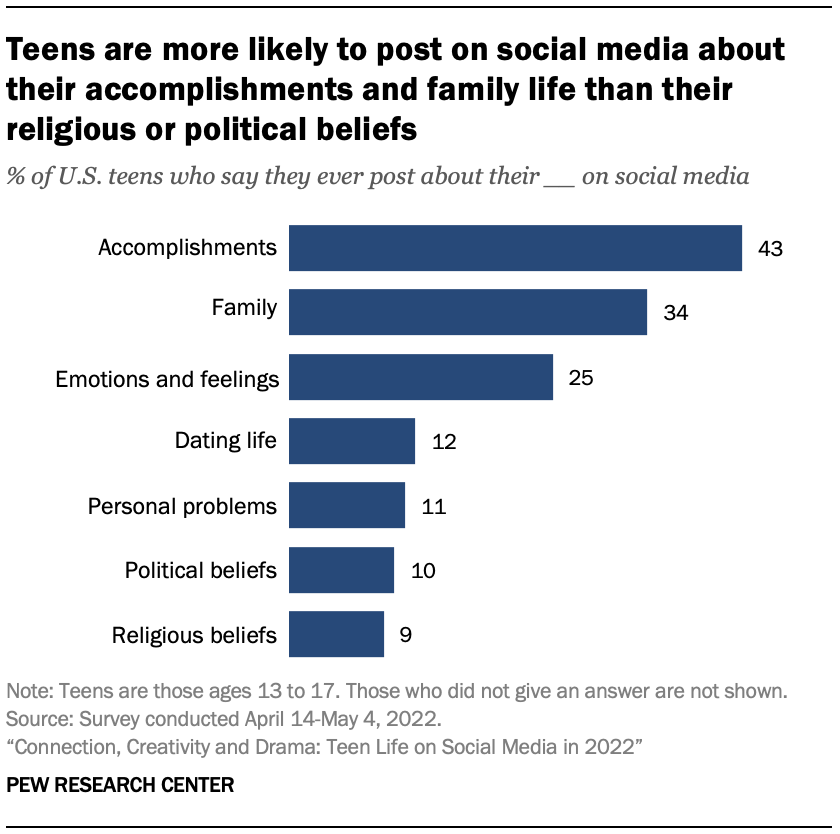
About four-in-ten teens (43%) say they post about their accomplishments on social media, 34% say they post about their family and 25% report sharing things related to their emotions and feelings. Smaller shares of teens – about one-in-ten – say they ever post about their dating life, their personal problems or their religious or political beliefs.
Older teen girls stand out in sharing a host of things on social media. Some 49% of 15- to 17-year-old girls say they ever post about their family, compared with a third or fewer of younger girls or of older or younger boys. And older girls are also more likely than their counterparts to post about their accomplishments, family, emotions, personal problems or dating lives. For further details about this, please see Appendix C.
Some teens – especially older girls – forego posting things on social media because it could be used to embarrass them
Teens may consider a variety of factors as they decide about whether or not to post on social media. This includes calculations about how they want to present themselves on these platforms and their judgments about potential consequences that may come with posting.
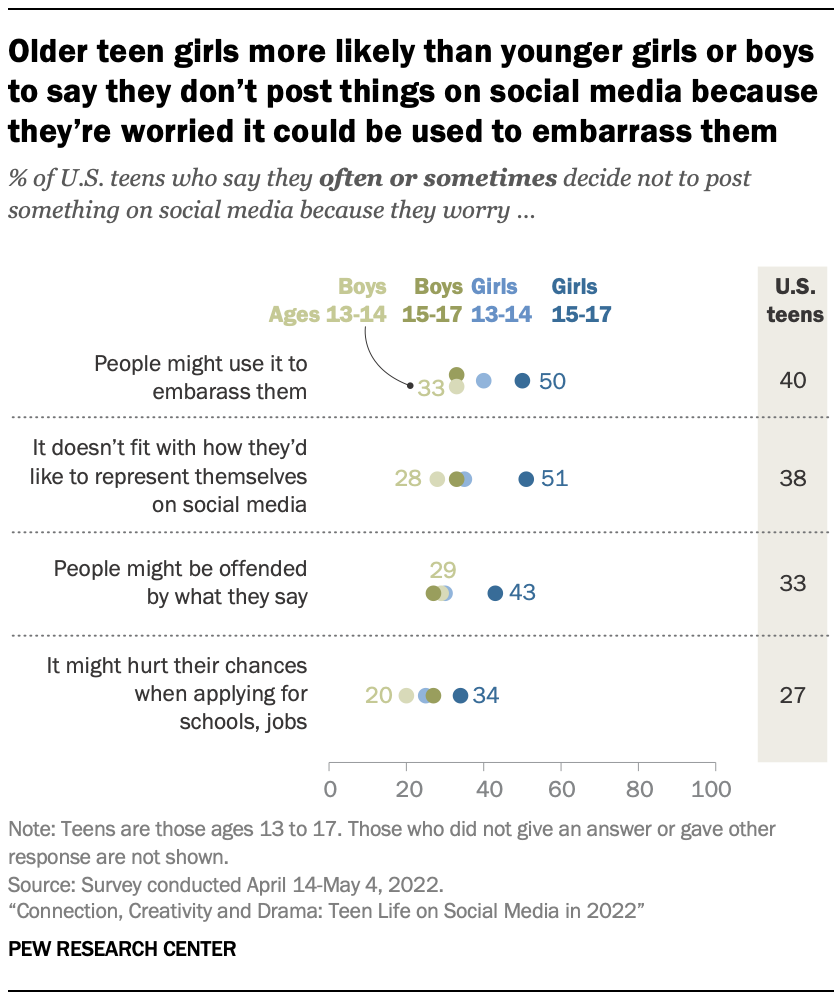
Some youth avoid sharing altogether because of fear of embarrassment: 40% of teens say they often or sometimes decide not to post something on social media because they worry people might use it to embarrass them. A similar share (38%) says the same about not posting something because it does not align with how they like to represent themselves on these platforms.
Additionally, one-third of teens say they at least sometimes do not share things on social media out of concern of offending others by what they say, and 27% say they forgo posting to social media because it could hurt their chances when applying for schools or jobs.
These concerns are more prevalent among older teen girls. Roughly half of 15- to 17-year-old girls say they often or sometimes decide not to post something on social media because they worry it doesn’t fit with how they’d like to represent themselves on these sites, compared with about one-third or less of younger girls or boys overall. Older girls are also more likely than younger girls or their male counterparts to report they at least sometimes don’t share something on social media because others might use it to embarrass them or because people might be offended by what they say.
Most teens are not politically active on social media, but their experiences and views related to online activism vary across parties
Involvement with political issues on social media can take many forms. Teens were asked about three ways they may engage with issues or causes on these platforms; only a small portion of them are actively engaging in activism on social media.
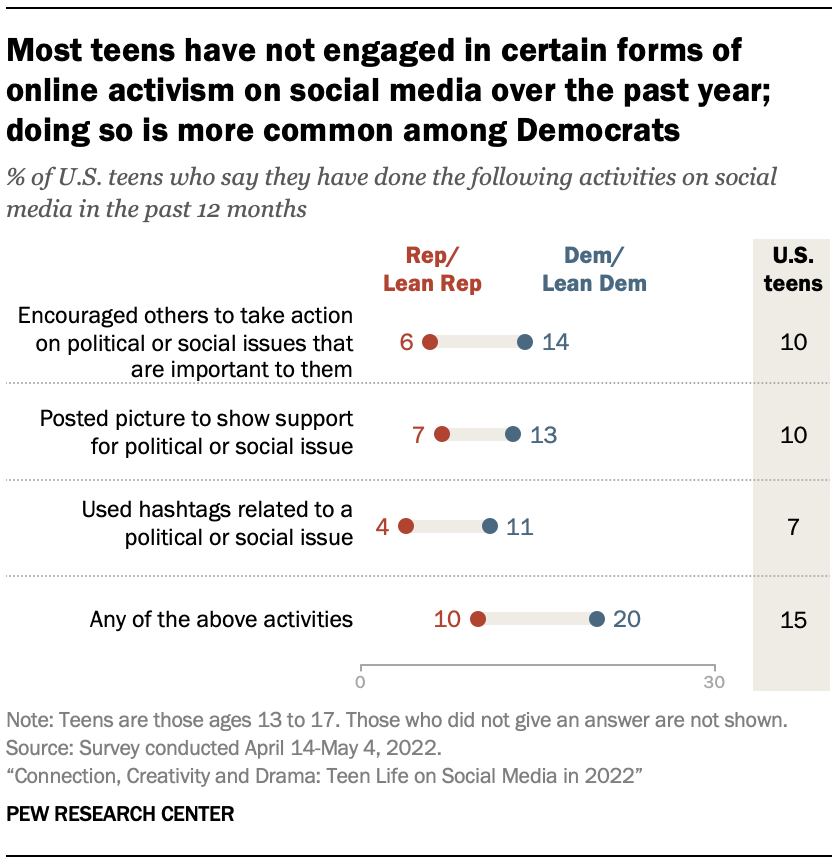
One-in-ten teens say that in the past 12 months they have used social media to encourage others to take action on political or social issues that are important to them or have posted a picture to show their support for a political or social issue, while a somewhat smaller share (7%) say they have used hashtags related to a political or social cause during this period. Taken together, 15% of teens have engaged in at least one of these activities on social media in the past year.
Majorities of teens across political parties are not engaging with political or social issues on social media in this way. Still, teens identifying as Democrats are more likely than their Republican counterparts to report participating in each of these activities.
Some 14% of Democratic teens – including independents who lean toward the Democratic Party – say they have used social media in the past year to encourage others to take action on issues they care about, compared with 6% of Republican and Republican-leaning teens. Democratic teens are also more likely than Republican teens to say that in the past year they have posted a picture to show support for a cause or used issues-related hashtags on social media. In total, Democrats are twice as likely as Republicans (20% vs. 10%) to have participated in this type of activism on social media in the past 12 months.
There are also some differences by age and gender, with older girls standing out as being more politically active on these platforms. One-in-five 15- to 17-year-old girls have engaged politically on social media in the past 12 months, compared with about one-in-ten younger girls (12%) or teen boys of any age (11%).
Only a minority of teens see social media as extremely or very important to them – or other people – for getting involved in key issues
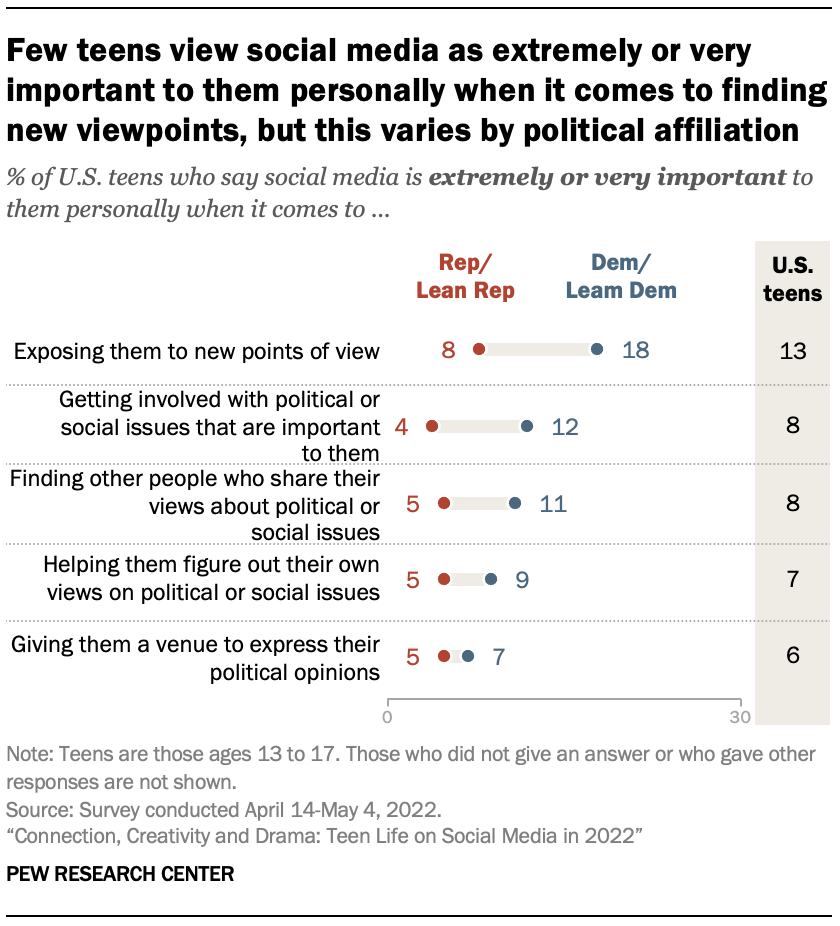
Most teens do not place a high level of personal importance on social media as a venue for political and civic engagement.
Overall, 13% of teens say social media is extremely or very important to them personally when it comes to exposing them to new points of view. Fewer than one-in-ten say these platforms are at least very important for finding others who share their view (8%), getting involved with political or social issues that are important to them (8%), figuring out their own views on an issue (7%) or giving them a venue to express their political opinions (6%).
Clear majorities do not view these platforms as personally important for engaging in these types of activities. For example, 65% of teens say social media is not at all important to them personally for giving them a place to express their political opinions.
The personal value that teens place on these platforms varies by political affiliation. Some 18% of Democratic teens say social media is extremely or very important to them when it comes to exposing them to new points of view, compared with 8% of Republican teens. Democrats are also more likely than Republicans to say these platforms are at least very important to them for getting involved with issues that are important to them, finding others who share their views or helping them figure out their own way of thinking.
Although social media has become a go-to tool for political engagement for some segments of the population, relatively few teens think it’s vital for people to use this medium for speaking out. Regardless of whether they do this, 17% of teens it is extremely or very important for people to speak up about political and social issues on social media, but a larger share – about four-in-ten – believe doing so is only a little (17%) or not at all (20%) important.
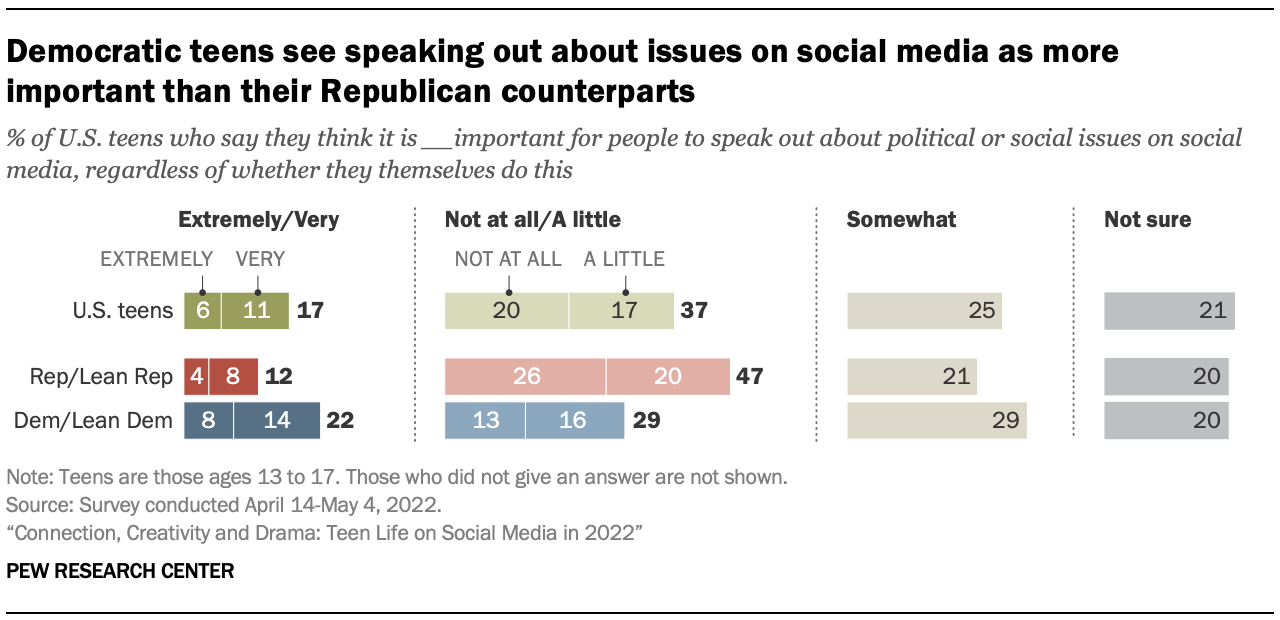
There is also a segment of this population who are uncertain about this subject: 21% of teens say they are not sure if speaking out in these ways on social media is important.
Not only are there partisan differences in being politically active on social media, Democrats and Republicans place varying degrees of importance of anyone speaking out on these platforms. Roughly half of Republican teens say it is only a little or not at all important for people to speak up about political and social issues on social media, compared with 29% of Democratic teens. Conversely, Democrats are about twice as likely as Republicans to believe it’s extremely or very important for people to speak up in this way (22% vs. 12%).


